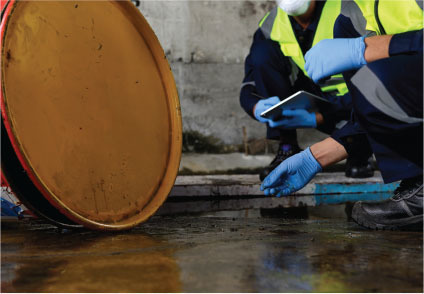June 2014
ON ETHICS: YOU BE THE JUDGE
International Incident
A US engineer discovers a Canadian firm has been performing engineering services without meeting the necessary state requirements.
The Situation
 Jim Tegun, P.E., is an engineer in private practice in State A. Tegun performs consulting engineering services for ensuring code compliance on a project that was originally designed by a consulting engineering firm based in Canada. Although the Canadian firm’s work met all appropriate engineering code requirements in State A, the work performed by the Canadian firm was not signed and sealed by a professional engineer licensed in State A. Tegun also discovers that the Canadian firm was not registered in State A to perform engineering services during the design and construction of the project, and that the Canadian firm had also been performing consulting engineering services in State A for a number of years without being properly registered. The Canadian firm’s engineers and the firm are all licensed in the Canadian province in which the firm is based. Tegun advises the State A engineering licensing board in writing of the unlicensed practice by the Canadian firm.
Jim Tegun, P.E., is an engineer in private practice in State A. Tegun performs consulting engineering services for ensuring code compliance on a project that was originally designed by a consulting engineering firm based in Canada. Although the Canadian firm’s work met all appropriate engineering code requirements in State A, the work performed by the Canadian firm was not signed and sealed by a professional engineer licensed in State A. Tegun also discovers that the Canadian firm was not registered in State A to perform engineering services during the design and construction of the project, and that the Canadian firm had also been performing consulting engineering services in State A for a number of years without being properly registered. The Canadian firm’s engineers and the firm are all licensed in the Canadian province in which the firm is based. Tegun advises the State A engineering licensing board in writing of the unlicensed practice by the Canadian firm.
Thereafter, Jim Tegun receives a notice from the Canadian firm advising him that he has not acted in an ethical manner because he did not first discuss the issue with the Canadian firm, but instead filed a written complaint against the Canadian firm.
What Do You Think?
Was it ethical for Jim Tegun to advise the State A engineering licensing board in writing of the unlicensed practice by the Canadian firm?
What the Board of Ethical Review Said
The practice of engineering increasingly occurs across international borders, which sometimes raises ethical issues for professional engineers and their firms. Engineering ethics principles are generally the same in most jurisdictions, although ethical values vary in some cases. Engineers practicing internationally or locally with international firms should be mindful of differences when they occur.
 While the facts in this case involve an American engineer doing business with foreign engineers and a foreign engineering company in the US, the Board believes some of the principles from earlier BER cases apply here. An American engineer working with international parties becomes aware of some type of illegal and unethical conduct; in the earlier cases, the engineer had the option of declining participation and walking away from the project, while in this, Tegun has already provided professional engineering services and later becomes aware of the possible violation of the law.
While the facts in this case involve an American engineer doing business with foreign engineers and a foreign engineering company in the US, the Board believes some of the principles from earlier BER cases apply here. An American engineer working with international parties becomes aware of some type of illegal and unethical conduct; in the earlier cases, the engineer had the option of declining participation and walking away from the project, while in this, Tegun has already provided professional engineering services and later becomes aware of the possible violation of the law.
It is the Board’s view that Jim Tegun had an ethical obligation to take action in connection with the Canadian firm’s apparent violation of the state engineering licensure requirements. At the same time, it may have been more respectful and diplomatic for Tegun to advise the Canadian firm of the action he planned to take and to provide an explanation for the action (e.g., Tegun’s obligation to report under the state engineering licensing law or the Code of Ethics), thus giving the Canadian firm an opportunity to become compliant on future projects rather than summarily reporting the potential violation by the Canadian firm to the state engineering licensing board.
Conclusion
Tegun had an ethical obligation to take action in connection with the Canadian firm’s apparent violation of the state engineering licensure requirements. However, under the circumstances, he should have first advised the Canadian firm of the action he planned to take and to provide an explanation for the action—he could also have encouraged the firm to self-report.
NSPE Code References
Section I.6: Engineers in the fulfillment of their professional duties shall conduct themselves honorably, responsibly, ethically, and lawfully so as to enhance the honor, reputation, and usefulness of the profession.
Section II.1.e: Engineers shall not aid or abet the unlawful practice of engineering by a person or firm.
Section II.1.f: Engineers having knowledge of any alleged violation of this Code shall report thereon to appropriate professional bodies and, when relevant, also to public authorities, and cooperate with the proper authorities in furnishing such information or assistance as may be required.
Section III.7: Engineers shall not attempt to injure, maliciously or falsely, directly or indirectly, the professional reputation, prospects, practice, or employment of other engineers. Engineers who believe others are guilty of unethical or illegal practice shall present such information to the proper authority for action.
For more information, please see BER Case No. 11-3.


 Volunteering at NSPE is a great opportunity to grow your professional network and connect with other leaders in the field.
Volunteering at NSPE is a great opportunity to grow your professional network and connect with other leaders in the field. The National Society of Professional Engineers (NSPE) encourages you to explore the resources to cast your vote on election day:
The National Society of Professional Engineers (NSPE) encourages you to explore the resources to cast your vote on election day:


